







1330 On Mar. 19 Edmund of Woodstock, 1st Earl of Kent (b. 1301) (6th son of Edward I) is executed for treason by order of Roger Mortimer and Queen Isabella before the walls of Winchester Castle for supporting his half-brother Edward II after he believes him to still be alive and tries to rescue him from prison; after nobody wants to do it for five hours, they finally get a convicted murderer to do the honors in exchange for a pardon; the incident turns the barons against the She-Wolf and He-Wolf, and their end is nigh? On Apr. 28 Mary-worshiping Benedictine Ettal Abbey in Bavaria is founded by German king and HRE (since 1314) Louis IV the Bavarian (1282-1347) near an Alpine pass where he passed on his 1328 journey to Rome from Augsburg, bringing them the marble Ettal Madonna on his way back; when he returns to Munich, Louis IV turns his court into a refuge for trendy pope-questioning philoafers, er, philosophers incl. Marisilius of Padua (1270-1342), William of Ockham (Occam) (1280-1347), and Michael of Cesena (1270-1342); meanwhile Pope John XXII fumes on, pulling every string to depose him. In the spring a group of Scottish Templars under Sir James "the Good/Black" Douglas, Lord of Douglas (b. 1286) leaves with the "Braveheart" of Templar king (1306-29) Robert I the Bruce (1274-1329) in a silver casket to be buried in the Holy Land; too bad, after getting detoured at pilgrimage site Santiago de Compostella, they get in the Aug. 25 Battle of Teba in Teba, Calavatra on the Andalusian frontier, becoming the first successful Christian battle against the Moors, in which Douglas is KIA, leaving swarthy infant bastard son-heir (by a Moorish woman?) "Black" Archibald Douglas the Grim, 3rd Earl of Douglas (1328-1400); the rest return to Scotland with Bruce's heart, which ends up in Melrose Abbey on the Scottish-English border as a charm to protect the kingdom, a nchoring the E side, while the heart of King John Balliol's father interned in Sweetheart Abbey in Galloway anchors the W side; a human heart is added to the Douglas coat of arms; the Bruce legend grows, turning him into the King Arthur of Scotland, "symbol of the integrity of the realm", James III later using his sword as a talisman; when Scottish poet Blind Harry comes out with The Wallace in the 1470s-1480s, William Wallace (more Gaelic) begins to eclipse him as Scotland's nat. hero; after the Mel Gibson's hit movie "Braveheart" comes out in 1996, Richard's heart is excavated in 1996, and his skull (excavated in 1819) is used to recreate his face. In Apr. after consolidating control of the Irrawaddy Delta and losing control of the coastal territories of Tenasserim to Sukhotai, king (since 1323) Saw Zein (b. 1303) is KIA while trying to take Prome in Upper Burma, and palace official Zein Pun (1295-1330) seizes control, becoming king #5 of the Burmese Hanthawaddy Kingdom; too bad, seven days later Saw Zein's wife Sanda Min Hla stages a putsch, giving the throne to Saw Zein's son (by princess May Hnin Htapi of Sukhothai) Saw E (Kankaung) (1303-30), who becomes king #6 of the Burmese Hanthawaddy Kingdom, and rules for 49 days until Sanda Min Hla poisons him and gives the throne to her half-brother Binnya E Law (1308-48), viceroy of Pegu, who in May becomes Burmese Hanthawaddy king #7 (until 1348), defeating a Sukhotahai invasion next year and moving the capital to Pegu. On July 25 Antipope (since 1328) Nicholas V abdicates, and Pope John XXII pardons him, and keeps him as an honorable captive in the new papal palace in Avignon. On Jan. 13 Frederick III the Handsome (b. 1289) of Austria dies, and the Hapsburgs sign the Treaty of Hagenau recognizing Louis IV the Bavarian (the epithet was meant to be derogatory by the pope, but he likes it?) as HRE, while brothers Otto IV the Merry (1301-39) and Albert II (the Wise) (the Lame) (1298-1358) rule Austria jointly. On Oct. 19 old-enough (17-y.-o.) Edward III of England, with the support of his former guardian (Edmund of Woodstock's cousin) Henry, 3rd Earl of Lancaster (1281-1345) stage a coup, taking Roger Mortimer and Queen Isabelle prisoner, then having him hanged in Nov. despite Isabelle's plea "Fair son, have pity on gentle Mortimer"; the regency is brought to a close, and Edward III begins his personal rule; Isabelle, the "She-Wolf of England" (stolen from Shakespeare's "Henry VI", where he uses it to refer to Margaret of Anjou) is declawed and put out of the way in Castle Rising in Norfolk, and he doesn't kill her even though she killed his daddy, even letting her visit the court and dote on her grandkids until she finally takes the habit of the Poor Clares? On Nov. 9-12 prince (since 1310) Basarab I (Cuman "father king") (John Bassaraba) (d. 1352) of Wallachia defeats Charles I Robert in the Battle of Posada in the Olt Valley of Transylvania, ambushing the well-armed Hungarian knights in a narrow ravine and pelting them with stones and arrows, losing almost none of his 10K shepherd troops, while the Hungarians lose almost all of their 30K troops, ending the Wallachian Revolt (begun 1325) and securing the independence of Walachia while ending Hungarian hopes of access to the Black Sea; Charles I Robert narrowly escapes clad in "dirty civilian clothes"; Transylvania is made safe for the coming of Vlad Dracula? - the William Walachia of Walachia and the Longshanks of Hungary? On Nov. 29 after three years as de facto ruler of England, Marcher lord Roger de Mortimer, 1st Earl of March (b. 1287) is executed by hanging in Tyburn for allegedly assuming royal power et al. Ottoman ruler Orkhan creates the Janissaries (Janizaries) (Yenicheri) ("new troops"), based on Devshirme, the practice of taking Christian boy captives aged 7-20, indoctrinating them into Islam, and training them as soldiers fighting for Islam (ends 1826); under Bayezid I the Christian converts become the sultan's loyal elite; the Janissaries eventually adopt the Bektashi Sufi Sunni-Shiite-Christian combo order; they are starved for sex, not necessarily with women but with boys, and only allowed it after capturing a Christian village, with a 3-day pass for rape and pillage? - hi, I'm Joseph you're Mary, no virgin birth this time? Countess Jeanne III of Burgundy inherits the county of Artois and the "free county" of Burgundy (Franche-Comte) (capital Besancon), which has been subject to the HRE since 1034, and ends up being separated from the duchy of Burgundy in 1477 and going to Austria in 1481 and Spain in 1556 before returning to France in 1678. Sultan Mohammed Tughluk of Delhi begins circulating copper fiat money to replace silver currency, but gives up because of counterfeiting. The Order of the Band, the 2nd secular order of knighthood is founded in Spain by Alfonso XI of Castile (first 1326). There are 30K Nestorians (Jinjiao) in China by this time. The Menetriers (Paris Musicians' Guild) is founded (until 1773). Giotto becomes the guest of Robert of Anjou, king of Naples. The Birkenhead-Liverpool Ferry in England begins operation when the Benedictine monks of Birkenhead Priory are granted a charter which only allows them to charge in the B-L direction. Nonfiction: Oderico da Pordenone (d. 1331) returns from the Far East after becoming the first Euro to visit Tibet, and dicates Description of Eastern Regions, claiming that Canton is 3x as large as Venice, and that Hangchow, located in Chekiang (Jujiang) Province on the East China Sea is the greatest city in the world; it becomes a bestseller for cents., esp. plagiarized versions by John de Mandeville. Hu Sihui, Complete Recipes for Dishes and Beverages; the dir. of the Chinese Yuan Dynasty imperial kitchen pub. the first known recipe for Peking Duck. Architecture: The Civic Tower (Torre Civica) next to Pavia Cathedral in Italy is first mentioned; after being enlarged in 1583, it falls down on Mar. 17, 1989. In this decade the Aztec capital of Tenochtitlan is enlarged by the construction of floating gardens in Lake Texcoco. Poetry: Anon., The Romance of Perceforest (6 vols.); composed in French in the Netherlands about this time (1330-44), about King Arthur, who leaves for Babylon, leaving King Perceforest as the new king of Britain, who introduces Christianity and founds the Franc Palais of free equal knights, then pierces the evil forest and is turned into a bear; first pub. in Paris in 1528. Juan Ruiz (1283-1350), The Book of Good Love (Libro de Buen Amor); ribald 1,728-stanza poem that chronicles medieval society and causes him to later be called the Spanish Chaucer. Births: Greek Orthodox Aristotelian monk-theologian Prochoros Kydones (Cydones) (Prochorus Cydonius) (d. 1369) in Thessalonica; brother of Demetrios Kydones (1324-98). English Prince of Wales Edward the Black Prince (Edward of Woodstock) (d. 1376) on June 15 in Woodstock; eldest son of Edward III (132-7) and Philippa of Hainault (1314-69); brother of John of Gaunt (1340-99). Ottoman bey #1 of Rumelia Lala Shahin (Sahin) Pasha (d. 1389); teacher (lala) of Sultan Murad I. English "Piers Plowman" poet and poor priest William "Long Will" Langland (Langley) (d. 1387) in Ledbury (Cleobury Mortimer?), Shropshire; educated at Great Malvern Monastery. Italian painter Altichiero da Zevio (d. 1395) in Zevio (near Verona); possible founder of the Veronese School of Painting, inspired by Giotto of Florence, which incl. Jacopo Bellini and Vittore Carpaccio. German philosopher-theologian Marsilius of Inghen (d. 1396). Bulgarian Hesychast metropolitan of Kiev and All Russia Cyprian (d. 1406). French alchemist Nicolas Flamel (d. 1418). Deaths: Italian painter Pietro Cavallini (b. 1259). Scottish military leader Sir James "the Good" "Black" Douglas (b. 1286) on Aug. 25 in Spain. English Marcher lord Roger de Mortimer, 1st earl of March (b. 1287) on Nov. 29 in Tyburn (hung). Austrian/German duke (1308-30) Frederick I/III the Handsome (b. 1289) on Jan. 13. Burmese king (1323-30) Saw Zein (b. 1303) in Apr. in Prome (KIA).

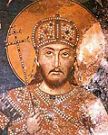
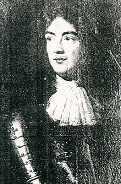
1331 On Mar. 2 the Ottomans conquer Nicaea (Iznik), and create their first madrassa (medrese) (Muslim religious college) out of a converted Christian church bldg. On Sept. 8 tfter having his father Stephen Uros III imprisoned, 7-ft.-tall Stephen (Stefan) Uros IV Dushan (1308-55) is crowned king of Greater Serbia (until Dec. 20 1355). On Sept. 12 Charles I (-1357) retakes the Rock of Monaco from the Genoese after 30 years, founding the House of Grimaldi. On Sept. 27 the Battle of Plowce sees Ladislas IV Lokietek defeat the Teutonic Knights in a Pyrrhic V - one more victory like that and we're kaput? On Oct. 22 after Godaigo's 2nd conspiracy to overthrow the shogunate becomes public, he is exiled to Oki Island (until 1333), and Kogon (1313-64) (personal name Kazuhito), 3rd son of Go-Fushimi becomes the first Japanese Ashikaga emperor of the N court of Kyoto (until July 7, 1333); the Ashikaga Revolt (ends 1392) sees the Ashikaga family revolt and take control of Japan, setting up a rival emperor in the N in Kyoto against the emperor of the S in Yoshino, who is considered more legitimate because he controls the Japanese imperial regalia; the disputed imperial succession in Japan leads to the Genko War, a civil war against the Hojo regents (ends 1333). On Nov. 24 David II (1324-71) of Scotland, 7-y.-o. son of Robert the Bruce is officially crowned at Scone (until Feb. 22, 1371), becoming the first Scottish king to be crowned and anointed with holy oil - greasy kids' stuff? Edward III of England renews his homage for his French lands. Cardinal Giovanni Visconti becomes bishop-lord of Novara. The forces of Granada siege Alicante and Orihuela; Spanish historian Jeronimo de Zurita y Castro (1512-80) later claims that they use cannon. Sir Henry St. Clair (Sinclair) (b. ?), grandmaster of the Templars who fought at the 1314 Baattle of Bannockburn and was gifted by Robert I with Pentland Moor is buried in Rosslyn. Inventions: The first record of woollen cloth weaving in England begins with two weavers from Brabant settling in York. Architecture: The Perpendicular Gothic transepts and choir of Gloucester Cathedral in England are begun (finished 1335). Novels: Giovanni Boccaccio (1313-75), Il Filicopo (1331-8). Deaths: Italian missionary Odoric of Pordenone (b. 1286) on Jan. 14 in Udine.
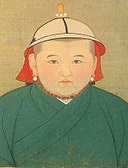
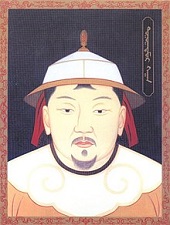
1332 The Black Death (Bubonic Plague), caused by Yersinia pestis starts in India. On July 23 eager for a new Crusade, Pope John XII writes to Venetian Doge Francesco Dandolo, telling him that the injustices they had suffered at the hands of the Turks could be a visitation of divine justice for allowing them too much freedom in their overseas possessions, causing them to agree to assemble a fleet of 20 galleys in Negroponte harbor next Apr. 15 to take them on; meanwhile in Aug. Umur Pasha (the Lion) of Aydin (1309-48), son of emir Mehmed of Lydia (Aydin) attacks Byzantine-held Gallipoli, followed by the N coast of Negroponte and the E shores of the Peloponnesus (Morea), followed by Salamis. On July 20 David II's guardian Earl Thomas Randolph of Moray (b. 1278) dies (poisoned?), and on Aug. 2 Earl Domhnall (Donald) II of Mar (1293-1332) becomes the new guardian (regent), and lasts just over a week; meanwhile Edward de Baliol (Balliol) (1284-1364) invades Scotland, landing in Fife with 2K men and unofficial backing from Edward III, and after many Scots join him he routs Earl Donald of Mar's army on Aug. 12 at the Battle of Dupplin Moor near Perth, killing Earl Donald, then is crowned king of Scotland at Scone on Sept. 24 using the regalia of his daddy John I Balliol, giving Scotland two kings, and beginning the Second War of Scottish Independence (ends 1357); after David II is secured in Dumbarton Castle, new guardian Sir Andrew Murray (de Moray) (Jr.) (1298-1338) of Avoch in Ross (David II's uncle) (son of the Andrew Murray who was KIA in the 1297 Battle of Stirling Bridge) is appointed, but he is captured trying to destroy the bridge over the Tweed River near Roxburgh, and Sir Archibald Douglas (1297-1333) (brother of the late Sir James "Good" Douglas of Braveheart fame), known for a "bludy heart" painted on his chest and shield is appointed guardian; the Bruce magnates regroup and drive Edward Balliol from Scotland in Dec., slaying his only brother Henry Balliol, and Edward flees to the protection of Edward III for a comeback after failing to gain popular Scottish support. On Sept. 2 Yuan emperor #7 (since Oct. 16, 1328) Tugh Temur (b. 1304) dies, and on Dec. 14 his younger brother Rinchibal becomes Yuan Nin Zong (1326-32), Yuan emperor #8, dying prematurely on Dec. 14; next July 19 he is succeeded by Toghon Temur, who becomes Yuan Hui Zong (Sun Di) (Shun Di) (1320-70), Mongol Yuan emperor #9 (last) of China (until 1368), stirring revolt by starting a strong anti-Chinese program after drought, famine, floods, and plague kill 5M in China in 1333, followed in 1334 by the Black Death, which strikes China's NE Hopei Province, then sweeps along the trade routes to Europe by 1347; by 1351 it kills 20M-30M in Europe (a third of Europe's pop., and up to 60% in some areas), and 75M worldwide by 1361; world. pop. decreases from 450M to 350M-375M by 1400; Europe takes 150 years to return to 1347 pop. levels; it ravages China, halving its pop. from 123M in 1200 to 65M in 1400. On Sept. 3 there is a great bullfight in the Roman Coliseum. On Sept. 28 the Battle of Muhldorf sees German King Louis IV defeat Frederick of Austria. Christopher II of Denmark is driven from the throne by Count Gerhard V of Holstein (1277-1323), who parcels out the crown territories, gives German nobles all the main fortresses, and gives German Hansa traders a blank check; Denmark goes into anarchy (until 1340). Verona conquers Brescia. Lucerne joins the growing Swiss League, which adds Zurich in 1351, Glarus in 1352, and Bern in 1353 to give seven cantons in the Swiss confederation. Yusuf I (1318-54) becomes Nasrid caliph #7 of Granada (until 1354); under his rule Granada reaches its zenith. The Knights Hospitallers capture Antiochia ad Cragum on the S coast of Turkey, renaming it Antiochetta (Antiocheta) (in Rufine) (Parva). The English Parliament is divided into two houses, lords and commons, although it takes until the late 15th cent. for the term "House of Commons" to be used, and the reign of Henry VII (16th cent.) for the term "House of Lords" to be used. The jurisdiction of English justices of the peace is expanded to incl. felonies and trespass. A co. of mastersingers is formed in Toulouse, France. Births: Arab Muslim polymath historian and social scientist Abd al-Rahman (Abdul-Rahman) Ibn Khaldun (Khaldoun) (d. 1406) on May 27 in Tunis, Africa; father of demography, cultural history, historiography, philosophy of history, sociology, economics, and the social sciences? Byzantine emperor (1341-76, 1379-90, 1390-91) John V (VI) Palaeologus (Palaiologos) (d. 1391) on June 18 in Didymoteicho; son of Andronicus III (1297-1342). Spanish king of Navarre (1349-87) and French count of Evreux (1343-87) Charles II the Bad (d. 1387) on Oct. 10 in Evreux, France; son of Philip III of Navarre (1306-43) and Joan II of Navarre (1312-49) (daughter of Louis X); husband of Joan of France (1343-73) (daughter of John II); always plotting to trump his family ties and Norman lands (which mommy received in 1328) to occupy the French throne. Swedish Brigittine nun (St.) Catherine of Vadstena (Sweden) (d. 1381) (b. 1331?); daughter of Ulf Gudmarsson, lord of Ulvasa, and St. Bridget (1303-73); feast day: Mar. 24. Chinese "Romance of the Three Kingdoms" novelist Luo Guanzhong (Ben) (d. 1400) in Taiyuan (Hangzhou?) (Jiangnan?). Spanish (Castilian) statesman-historian-poet Don Don Pedro Lopez de Ayala (d. 1407) in Vittoria; of an aristocratic Jewish convert (converso) family; ancestor of Spanish poets Inigo Lopez de Mendoza, Jorge Manrique, and Diego Hurtado de Mendoza; his sister Ines marries into the converso Guzman family, becoming the ancestor of Sir Philip Sidney, Anne Hutchinson, Anne Bradstreet, Robert E. Lee, Oliver Wendell Holmes, Edwin Arlington Robinson, Humphrey Bogart, Tennessee Williams, Chevy Chase, and six U.S. presidents, incl. the Bushes - a nutrient found in breast milk to support brain function? Deaths: Byzantine emperor (1282-1328) Andronicus II Palaeologus (b. 1259) on Feb. 13 in Constantinople. Greek scholar-statesman Theodore Metochites (b. 1270). Chinese Mongol Yuan emperor #7 (1328-32) Tugh Temur (b. 1304).

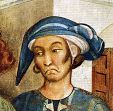
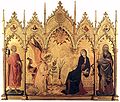
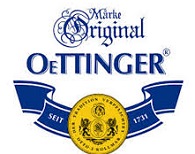
1333 In 1333-7 drought, famine, floods, and plague kill 5M in China incl. 4M in Kiang, laying the ground for Europe's Black Death? On Mar. 2 Wladyslaw I the Elbow-High (b. 1260) dies, and his son Casimir (Kasimir) III (the Great) (1310-70) becomes king of Poland (until Nov. 5, 1370) becoming the only king of Poland to receive and keep the title of "Great". In June a Marinid army led by Abd al-Malik, son of Marinid sultan Abul Hassan retakes Gibraltar from Castile after a 5-mo. siege (until 1462). On July 7 after escaping from Oki Island and raising an army at Fungami Mt. in Hoki Province, Godaigo seizes the Japanese throne in Kyoto from Kogon, forcing the Hojo regents out of power and ending the Kamakura Shogunate along with the Genko War (begun 1331), beginning the Kemmu Restoration (ends 1336), attempting to end the days of the shoguns and rule like an emperor should. On July 19 after Edward Balliol returns with an English army led by tickled pink Edward III, whom he acknowledges as overlord, they defeat David II's Scots led by incompetent Sir Archibald Douglas (who drops Robert the Bruce's proven guerrilla tactics and adopts a conventional English style) at the Battle of Halidon Hill ("the Scottish Cannae"), avenging the 1314 Battle of Bannockburn; the English archers devastate the antiquated Scottish knights (they paid for enough arrows this time?); badass Scottish Knight Templar Adam de Vipont (Blencowe) (1310-67) is captured; 16-y.-o. future Scottish king Robert Stewart leads a div.; on July 22 Balliol's army retakes nearby Berwick-upon-Tweed (held since 1318); Edward Balliol is made to renew his homage to Edward III and grant him all the S shires of Scotland occupied by the English, then ends up increasingly marginalized over the next decade as Edward III turns to France, leaving him to be pushed S from his family lands in Galloway by the down-but-not-out pro-Bruce Scots until he holds only the island fortress of Hestan in the Solway Firth. In Aug. after the promised Crusader fleet at Negroponte fails to materialize, King Robert of Naples writes Pope John XXII, telling him he should earmark all the tithes from Italy for the Crusade, causing the pope to reply on Nov. 19 that he needs French king Philip VI's consent, putting a damper on it. On Dec. 18 a large number of professors at the U. of Paris meet to discuss Pope John XXII's opinion that the saints do not enjoy the complete Beatific Vision (Visio beatifica) until after the Last Judgment, getting so pissed-off that on Dec. 19 Philip IV orders 29 professors to meet in Vincennes to continue the discussion, and they reject the pope's opinion, after which a 2nd assembly does ditto on Jan. 2, 1334, causing the pope to withdraw his opinion on Dec. 3, 1334. After the Germans, led by John of Bohemia, Louis of Hungary, Albert of Austria, and Louis of Brandenburg force the Poles to conclude a truce, the First Polish-German War (begun 1326) ends with a Teutonic V; King John of Bohemia begins a campaign in Italy on behalf of the Guelphs (ends 1335). The first regular shipment of wine from Portugal to England is made. Oettinger Brewery (Brauerei) is founded in Oettingen in Bavaria, Germany, going on to becoming the best-selling brand in Germany in 2004 (5.29M barrels in 2011), keeping prices low by not advertising. Architecture: The town hall (Rathaus) in Aix-la-Chapelle (Aachen), Germany is begun on the ruins of Charlemagne's palace (finished 1370). Art: Italian Sienese painter Simone Martini (1284-1344) finishes The Annunciation for the Siena Cathedral, then moves to Assisi (until 1339), painting the fresco Life of St. Martin for the chapel of St. Martin in the Lower Church. Deaths: Italian antipope (1328-30) Nicholas V (b. 1260) on Oct. 16 in Avignon. Polish king (1320-33) Wladyslaw I the Short (b. 1260) on Mar. 2 in Cracow.



1334 The Black Death strikes in China's NE Hopei Province, then sweeps along the trade routes to Europe by 1347; "Constantinople, summer of 1334. It marched through the streets, the sewers. It left the city by oxcart, by sea to kill half of Europe. The rats, rustling and squealing in the night as they too died... the rats!" - Eyewitness Flint in 1969 Star Trek episode Requiem for Methuselah - could it be a Templar plot to get even? In May David II becomes the 2nd Bruce king of Scotland to be sent into exile, leaving with his family via ship from Dumbarton to Chateau Gaillard in Normandy under protection of Philip VI of France, where he is tutored by the Abbot of Kelso and given military training by Robert Keith the Marischal; Robert Stewart's lands in W Scotland are overrun by Edward Balliol's army, causing him to escape by boat to Dumbarton Castle, where he stays and links up with the Campbells of Lochawe to fight on, becoming the king's lt. (until 1335); meanwhile Sir Andrew Murray Jr. is ransomed, and decides to become Scotland's Fabius Maximus, known for leading an invader around in circles to wear them out, and sieges and captures the Comyn stronghold of Dundarg in Buchan in NE Scotland on Dec. 23, capturing Henry Beaumont and making Edward III pay a large ransom for him. On Sept. 14 (Wed.) the naval Battle of Adramyttium (Edremit) sees the 20 Venetian galleys under Pietro Zeno (-1345) defeat emir Yakhshi of Karasi, reducing Turkish raids in the Aegean Sea, setting things up for the promised new Crusade; too bad, on Dec. 4 Pope (since 1316) John XXII (b. 1249) dies, and on Dec. 20 former Cathar-broiling inquisitor (Cistercian monk and bishop of Pamiers) Jacques Fournier is egg-lected Pope (#196) Benedict XII (-1342), becoming Avignon pope #4, dropping plans for the Crusade, allowing Umur Pasha to resume his attacks next year, starting with Morea, and the Turkish menace on the E Mediterranean blossoms until new pope Clement VI is elected in 1342, with plundering of the Aegean islands and Greek mainland, incl. Crete. The original Schindler's List? On Oct. 9 Polish king Casimir III the Great confirms the privileges grantted to the Jews in 1264 by Boleslaw V the Chaste, enacting protection laws and allowing them to settle in Poland in large numbers as "people of the king". Madurai in Tamil Nadu, S India revolts and sets up the Muslim Madurai Dynasty (until 1378) under Sultan Jalal-ud-Din Ahsan Shah (-1339). Ibn Battuta reaches Delhi, and is given a warm welcome with lavish gifts. Schwechat SE of Vienna, Austria is first mentioned. The Clarenceux (Clarencieux) King of Arms is founded at the College of Arms of London, becoming the senior of two provincial kings of arms, with jurisdiction S of the Trent River. Architecture: Giotto becomes chief architect of the Florentine Cathedral of St. Reparata (Santa Maria del Fiore), and begins the W facade and the detached Campanile. The Cistercian-style Papal Palace (Palais des Papes) in Avignon, France is begun by Pope (1334-42) Benedict XII (finished in 1362); his successor (1342-52) Pope Clement VI adds a Gothic-style New Palace with massive towers and 165-ft. stone walls to show the grate powah of the papacy. Births: Spanish (Castilian) count (1366) and king (1369-79) Don Enrique (Henry) of Trastamara (Trastámara) (Henry II) (the Fratricide) (d. 1379) on Jan. 13 in Seville; illegitimate son of Alfonso XI; half-brother of Pedro I the Cruel (1334-69); mother is partly Jewish descent, but that doesn't stop him from becoming the first noble in Spain to use anti-Semitism as a political tool? Spanish (Castilian) king (1350-66, 1367-9) Peter (Pedro) I (the Cruel) (the Just) (d. 1369) on Aug. 30 in Burgos; son of Alfonso XI; half-brother of Henry II Trastamara (1334-79). Anatolian poet (Muslim) Tajuddin Ibrahim Ahmedi (d. 1413). Deaths: Iranian Safavid Sufi order founder Shaykh Safi al-Din (b. 1253) in Ardabil; his descendants become Shiites, and try to coverup his Sunni origins after the Safavid Dynasty comes to power in Iran in 1501? English chronicler Nicholas Trivet (b. 1257); leaves Annales Sex Regum Angliae qui a Comitibus Andegavensibus Originem Traxerunt, covering the Angevin kings from 1135-1307; also leaves a commentary on St. Augustine's "De Civitate Dei".
1335 A big year for witch burnings in Roman Candle, er, Roman Catholic France; meanwhile the Joachites claim that this is definitely the End of Days (1 + 5 = 6, get it?). They came from farmlands and chicken coops, hoping to star on their own scratch ticket? In Apr. the Scottish parliament meets in Darsie near Cupar in Fife, and fail to heal their differences, but do agree on a scorched earth policy, ordering the Scots in the S to seek refuge in the hills with their livestock and moveable goods; by summer the English control S and C Scotland, and in July Edward III comes with a huge army in hopes of finishing the pesky Bruce supporters off, then leaves after failing to force a battle, after which Edward Balliol departs also, leaving David III of Strathbogie, 11th Earl of Atholl (b. 1309) to mop up the pesky rebels, esp. in the NE, and his shadow is so great that it is said that only children at play admit to being King Davy's men, and the Bruce cause reaches its lowest point; meanwhile in Sept. the Scottish parliament meeting in Dumbarton Castle appoints Sir Andrew Murray Jr. (who was ransomed the previous year) as guardian of Scotland again, and he assembles a loyal army of 1K which incl. Sir William Douglas and William Keith, rekindling memories of William Wallace and Robert I the Bruce; he then goes N to the aid of his fighting wife Lady Christina Bruce (de Brus) (1278-1357), sister of Robert I the Bruce, who is being sieged in Kildrummy Castle in Aberdeenshire by an Anglo-Scottish force of 3K led the Earl of Atholl, causing him to raise the siege and march S to meet him; on Nov. 30 (St. Andrews Day) they meet at the Battle of Culblean near the Dee River, which is a big V for the Scots, becoming the turning point in their Second War of Independence; Strathbogie is KIA, along with Walter Comyn, Thomas Comyn, and Edward Balliol becomes a king without a kingdom; Murray spends the winter trying to reduce the remaining English fortresses, while Edward III disposesses (by 1337) over 100 freeholders in S Scotland to break Bruce's support, while Edward Balliol spends the winter of 1335/6 in England "because he does not yet possess in Scotland any castle or town where he could dwell in safety" (Lanercost Chronicle). On May 2 in Linz HRE Louis IV the Bavarian invests his Hapsburg relatives Duke Albert II of Austria and Duke Otto of Austria with the duchy of Carinthia in S Austria, which is ruled by the Hapsburgs until 1918. On Dec. 1 Persian Mongol Ilkhanid khan (since 1316) Abu Sa'id (b. 1305) dies in Soltaniyeh without an heir or appointed successor, after which the Ilkhanid Dynasty (founded 1256) quickly disintegrates into competing provincial states in Iran, Iraq, and E Anatolia, until Turcoman Timur mops them up in the 1380s-90s: the Muzaffarids in Shirz, the Karts in Herat, the Shiite Sarbvadars in Sabzavar in E Iran, the Dulkadirs on the upper Euphrates, and the Jalayirids in Iraq and Azerbaijan with capital in Baghdad; Eretna of Rum (of Uyghur origin) declares himself sultan of his own Principality of Eretna in NE Anatolia (ends 1381). King John of Bohemia's campaign in Italy (begun 1333) ends unsuccessfully. Bohemia acquires the mixed Polish-German town of Breslau (Wroclau) on the Oder River in Silesia. Verona conquers Parma and Lucca, pissing-off the other Italian dukes of Florence, Siena, Bologna, Perugia and Venice, who form a league against him, getting the Visconti of Milan, the Este of Ferrara, and the Gonzaga of Montua to join next year, plus the papal states, causing Mastino II and Alberto II della Scala to be surrounded and sue for peace (1339). Muslim pirate Umur Pasha of Aydin meets with future Byzantine emperor (1347) John (VI) Cantacuzene and becomes good friends, promising not to attack Byzantine territories but concentrate on Roman Catholic (Latin) (esp. Venetian) ones. Inventions: Just in time to toll the plague deaths, the first public striking clock is installed in the palace chapel of the Visconti in Milan, powered by falling weights and springs - don't ask for whom the bell tolls? Nonfiction: Italian physician Guido da Vigevano (1280-1349) becomes royal physician to Philip VI and Joanna I of Navarre, and expecting him to go on Crusade, composes the 23-folio book Texaurus Regis Francie, with nine folios on how to take care of his health, and 14 folios on hi-tech Medieval military technology, containing sketches sans perspective of his inventions, incl. armored chariots, siege engines, and wind-driven battle wagons (the first automobile?). Richard of Wallingford, Quadripartitum de Sinibus Demonstratis; the first original Latin treatise on trigonometry. Births: Korean Joseon (Choson) Dynasty king #1 (1392-98) Taejo (Yi Seong-gye) (Ni Dan) on Oct. 27 in Hamheung, Hamgyeong; father of Jeongjong (1357-1419). Deaths: Persian Mongol Ilkhanid khan (1316-35) Abu Sa'id (b. 1305) on Dec. 1 in Soltaniyeh.


1336 On Jan. 24 Alfonso IV the Kind (b. 1299) dies, and his son Peter IV (the Ceremonious) (of the Little Dagger) (1319-87) becomes king of Aragon, Valencia, Sardinia, and Corsica, and count of Barcelona (until 1387) - are you thinking what I'm thinking about that little dagger part? On Feb. 25 after being surrounded by the Teutonic Knights, 4K defenders of Pilenai, Lithuania commit suicide. On Feb. 25 Japanese emperor (since Mar. 29, 1318) Godaigo is ousted by shogun Takuji of the Ashikaga family, ending the Kenmu Restoration (begun 1333) and beginning the Muromachi Shogunate (ends 1573), installing a puppet emperor in Kyoto; the Kemmu Restoration (begun 1333) is kaput after three measly years, but its great dream stays alive to bite the shogunate in the ass all the way to the Meiji Restoration of 1868; the Chinese Mandarins attempt to deprive the pesky Japanese barbarians of their swords by adopting a policy of buying and importing all the swords from them they can get, which only causes them to produce more? On Apr. 14 Shogun Ashikaga Takauji (1305-58) arrives in Munakata, the Battle of Tatarahama in Tatarahama on Hakata Bay in Fukuoka is a V for the Ashikaga Shogunate over the Kukuchi Clan of Higo, Kyushu, who are loyal to emperor Daigo, securing the island of Kyushu. On Apr. 18 the Vijayanagara ("city of victory") (Karnata) Empire (Kingdom of Bisnegar) (modern-day Hampi) (ends 1646) is founded on the banks of the Tungabhadra River in the S Deccan Plateau in S India by brothers Harihara and Bukka Raya from Warangal, who defeat the neighboring sultans N of Kistna and Tungabhadra and dominate S India by 1370, becoming a Brahman and Dravidian center, protecting India's S flank from Muslim invasion; temple patronage is expanded beyond the twice-born castes to Shudras, merchants, and women. On Apr. 26 Italian humanist poet Petrarch (Francesco Petrarca) (1304-74), his brother, and two servants climb to the summit of windy 1,912m Mount Ventoux overlooking the Bay of Marseilles, with Petrarch claiming to be inspired by Philip V of Macedon (-238 to -179)'s ascent of Mount Haemo in the Balkans, sitting on top to read St. Augustine's "Confessions", discovering that "nothing is wonderful but the soul, which, when great itself, finds nothing great outside itself", after which "not a syllable fell from my lips until we reached the bottom again", the descent signifying the real start of the Renaissance?; Petrarch becomes the first known Alpinist, one who climbs mountains merely for enjoyment?; a local told him that nobody had ascended it before he did it 50 years earlier, although French priest Jean Buridan (1295-1363) did it a few years earlier, and in the 11th cent. it had been done by St. Anno II (1010-75), archbishop of Cologne. In the summer Edward III invades Scotland again, intending to lay NE Scotland waste to forestall French aid, and burns Aberdeen, causing Robert Stewart to submit to him (until 1341); the construction of New Aberdeen begins shortly afterward; after Edward returns to England, Sir Andrew Murray Jr. emerges from hiding, and goes back to attacking English strongholds during the winter, capturing Dunnotar, Lauriston, and Kinneff, and destroying Gowrie, Angus, and Means; lucky for the Scots, a powerful French noble is banished, and obtains refuge at Edward III's court, where he incites him to attack France. On July 4 the Battle of Minatogawa (Minato River) in Settsu Province in modern-day Kobe is a V for 35K Ashikaga rebels led by Ashikaga Takauji over 17.5k imperial forces loyal to Emperor Godaigo led by Kusinoki Masashige (1294-1336), who is KIA, becoming famous for his loyalty. Count Louis I of Flanders (1304-46) prohibits commercial relations with England, causing Edward III to retaliate by imposing an embargo on wool exports to Flanders as well as the import of Flemish woven goods to England next year, which throws the weavers out of work, causing them to begin the Weaver's Revolt of 1369-71. Dauphine (Dauphiné) is purchased by the French crown, becoming the first important imperial fief added to French territory, with capital at Grenoble, while the royal bureaucracy runs the kingdom as a possession rather than obligation to the increasingly inaccessible king. Mathematics becomes a compulsory subject for a degree at the U. of Paris - have to cipher as good as Jethro Bowdeen? Jeanne de Bar (1295-1361) succeeds her younger brother Edouard de Bar as grandmaster of the Priory of Sion (until 1351) :). Births: Japanese Ashikaga pretender emperor #4 (1352-71) Go-Kogon (Iyahito) (d. 1374) on Apr. 14; 2nd son of Kogon (1313-64). Serbian king (1371-95) Prince Marko Mrnjavcevic (d. 1395); eldest son of Vukasin Mrnjavcevic and Alena. Turco-Mongol conqueror ("Lord of the Fortunate Conjunction") ("Emperor of the Age") ("Conqueror of the World") (Sunni Muslim) Tamerlane (Timur the Lame) (Tamburlaine) (Timur-i Lang) (Timur Lenk) (Timur Leng) (Tamerlano) (d. 1405) (Chaghatay "temur" = iron) on Apr. 9 near Kesh (50 mi. S of Samarkand) in Transoxiana (modern-day Uzbekistan); born into the Turkish-speaking Sunni Muslim Mongol Barlas clan; claims descent from Ali, son-in-law of Muhammad and mythical Mongol queen Alanquoa; husband of Zenocrates; in 1363 he tries to steal sheep but is shot by two arrows from the shepherd, in the right leg and right hand (losing two fingers), crippling him for life; speaks Persian, Mongolian, and Turkish; motto: "Rasti rusti" (Lat. Veritas salus) (Truth is safety); likes to play polo with enemy skulls, erecting 30-ft.-high skull pyramids to celebrate Vs; grandfather of Ulugh Beg (1394-1449); great-great-great-grandfather of Babur (1483-1530). Deaths: Kubrawiyya Sufi order founder Ahmad Simnani (b. 1261). Japanese Yamato emperor #93 (1298-1301) Go-Fushimi (b. 1288) on May 17. Spanish king of Aragon (1327-36) Alfonso IV the Kind (b. 1299) on Jan. 24. English noble Edouard de Bar (b. 1302) off the coast of Cyprus (shipwreck).
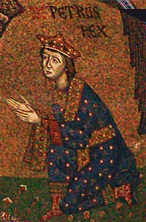


1337 In Feb. Sir Andrew Murray Jr., taking advantage of Edward III's invasion preparations for France, captures Kinclaven Castle near Perth, followed by St. Andrews Castle on Feb. 28, which he captures using his wooden siege tower called Boustour, which he then uses to recapture his own castle in Bothwell in Mar.; he then romps into N England, raiding Cumberland and Northumberland William-Wallace-style; too bad, from this year to 1453 the English began spreading Scotophobia, spreading disdain, fear, and hatred of the Scots, painting them as untamable barbarians. We can't go on together with suspicious minds? On May 24 after Philip VI conquers the larger part of the English possessions in France S of the Loire, and comes to the aid of Scotland against England, causing Edward III late in the year to cease leading Scottish campaigns in person and declare war on France over these issues as well as the problem of French control of Flanders (which has become interdependent with England because of the wool trade), using his dormant claim to the French throne through his mother Isabelle (Philip IV's daughter) as a pretext, even though it had been excluded by the French courts under the Salic Law, the 116-year Hundred Years' War begins (ends Oct. 19, 1453), which is characterized by the frequent use of the chevauchee using small groups of horsemen to pillage enemy territory to draw the enemy into a fight; England allies with the Count of Hainault and Holland (Edward's father-in-law), as well as HRE Louis IV the Bavarian (because Philip VI is the protector of new Avignon pope Benedict XII, and prevented any agreement between them over his investiture); the rebelling weavers of Ghent, led by wealthy Flemish brewer Jacob van Artevelde (the Wise Man) (the Brewer of Ghent) (1290-1345) virtually take over Flanders, causing Artevelde to be made capt.-gen. of the city, then welds the Flemish cities into a federation committed to armed neutrality. On June 25 Frederick III (b. 1272) dies after welding Sicily into a united kingdom, and his son Peter II (1304-42) succeeds as king of Sicily (until Aug. 15, 1342) despite the Peace of Caltabellotta. The Ottomans conquer Nicomedia (Izmit) from the Byzantines and begin spreading through Thrace - where's Spartacus? The Dulkadir (Dhu al-Qadr) Dynasty (Principality) is founded by the Turkoman Dulkadir Dynasty on the upper Euphrates River, with capital at Elbistan, where it acts as a buffer state between the Mamluks and Ottomans (ends 1515). Sultan Mohammed Tughluk of Delhi sends an army of 100K horsemen through Kangra into the Hamalayas in an attempt to conquer Tibet and China, but rains, disease, and hill tribesmen wipe them out. HRE Louis IV the Bavarian bestows the privilege of conquering Lithuania and Russia to the Teutonic Knights after they start by only petitioning for three small territories; he later gives their members immunity from being tried in foreign courts over territorial disputes with their rulers. The hereditary rank of duke is created in England, and Cornwall becomes a duchy for Edward the Black Prince of Wales, who was already created earl of Chester in 1333. Architecture: Giotto (b. 1267) dies, and his student for 24 years Taddeo Gaddi (1300-66) becomes the leading painter in Florence, continuing work on the Campanile, and building the Ponte Vecchio on the Arno River. Science: William Merlee of Oxford, England attempts the first scientific weather forecasts. Births: Scottish Stewart king #2 (1390-1406) Robert III (John Stewart, Earl of Carrick) (d. 1406); eldest son of Robert II (1316-90) and 1st wife Elizabeth Mure (-1355); brother of Robert Stewart, duke of Albany and earl of Fife (1339-1420), and earl Alexander of Buchan and Ross; half-brother (by Robert II's 2nd wife Euphemia Ross) of earl David of Strathearn and Earl Walter of Atholl; great-nephew of David II; husband of Anabella Drummond (1350-1401); father of duke David Stewart of Rothesay (1378-1402) and James I (1394-1437). French "Froissart's Chronicles" traveler-poet and court historian Jean Froissart (d. 1410) in Valenciennes, Hainaut. Deaths: Florentine artist-architect Giotto di Bondone (b. 1267) on Jan. 8 in Florence: "Every painting is a voyage into a sacred harbor"; "The human heart is a frail craft on which we wish to reach the stars." Italian poet-jurist Cino da Pistoia (b. 1270). Spanish king of Sicily (1295-1337) Frederick III (b. 1272) on June 25 in Paterno. Mali king #10 (1312-37) Musa Keita I (b. 1280). Dutch count of Holland and Zeeland (1304-37) William I of Hainaut (b. 1286) on June 7.
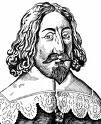


1338 On Jan. 13 the English, led by Edward III's main man William Montagu (de Montacute), 1st Earl of Salisbury (1301-44) siege Dunbar Castle in East Lothian, Scotland, and since its master Patrick Dunbar is away fighting, his manly woman wife "Black" Agnes Randolph, Countess of Dunbar and March (1312-69), daughter of Robert II's nephew Thomas Randolph, earl of Moray takes the stankin' English on with a few guards and servants, uttering the soundbyte: "Of Scotland's king I haud my house. He pays me meat and fee, and I will keep my gude auld house, while my house will keep me"; on June 10 after she has her maids dress in their Sunday best and dust off the battle damage with handkerchiefs to mock him, then rolls a huge boulder onto his siege engines, and rebuffs an attempt to hold her captured brother John Randolph, 3rd Earl of Moray (1306-46) as a threat, they give up, causing a ballad to be composed, with the line "Cam I early, cam I late, there was Agnes at the gate." After Flanders declares neutrality in the Hundred Years' War, Edward III restores commercial relations and signs a commercial treaty. Andrew Murray Jr. dies in his castle in Avoch, and his remains are laid next to Robert I the Bruce in Dunfermline Abbey; Scottish king David II's 8-year-older half-nephew (son of Walter Stewart the Steward and Margaret, daughter of Robert I and his 1st wife Isabella of Mar) Robert Stewart the Steward (1316-90) (later Robert II) becomes David II's guardian (until 1341), going on to recover C and SW Scotland from Edward Balliol while Edward III is overextended in France. Bengal is taken from Delhi by the Balban Dynasty (until 1539). An imperial diet is held in the Kastorkirche in Coblence, and Edward III is HRE Louis IV the Bavarian's guest. The Declaration (Treaty) of Rhense (Rhens) by six electors declares that an election by a majority of electors automatically confers the royal title and rule over the HRE without papal confirmation. Pisa U. in WC Italy is established as a studium generale. Nonfiction: Robert Mannyng (1260-1340), The Story of Inglande; verse chronicle based on "Roman de Brut" by Wace and "Chronicle" by Peter Langtoft (-1307) of England; modifies Middle English by dropping inflections and introducing French words, heading toward the bastard language of modern English. Poetry: Giovanni Boccaccio (1313-75), Il Filostrato (verse tale). Births: French Valois king #3 (1364-80) Charles V (the Wise) (d. 1380) on Jan. 21 in Vincennes, Ile-de-France; son of John II the Good (1319-64) and Bona (Bonne) of Bohemia (Luxemburg) (1315-49); husband of Jeanne de Bourbon (1338-78); father of Charles VI the Well-Beloved/Mad (1368-1422). English lord Thomas de Beauchamp, 12th Earl of Warwick (d. 1401) (pr. "beecham") on Mar. 16; son of Thomas de Beauchamp, 11th earl of Warwick and Katherine Mortimer, daughter of Roger Mortimer, 1st earl of March; knighted in 1355. Swedish king (1364-89) Albert (Albrecht) of Mecklenburg (d. 1412) in Mecklenburg; 2nd son of Albert II of Mecklenburg (1318-79) and Euphemia Eriksdotter (sister of Magnus II of Sweden).


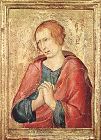
1339 On Sept. 24 Ghibelline Simone (Simon) Boccanegra (It. "black mouth") (-1363) becomes the first doge of Genoa, trying to control the every-family-for-itself republic, starting by excluding the old mercantile patriarchate of the Guelfs and putting his boys in power, the mercantile houses of Adorno, Guardo, Fregoso, and Montaldo; after executing his first intended assassin on Dec. 20, Boccanegra creates a bodyguard of 103 mounted soldiers from Pisa, provided by his brother Niccolo, "captain of the people", made possible by his mother, a Pisan aristocrat; too bad, after being ousted from power in 1345 and regaining it in 1356, they poison him in 1363, and he checks out with a black you know what. Self-proclaimed French king Edward III (1312-77) of England invades and ravages N and E France, sacking Dieppe, but is unable to repay a $7M loan to finance the war, and is brought under a petition of bankruptcy, becoming the first Euro nat. ruler to declare bankruptcy - do the math? David II of Scotland fights against Edward III in Philip VI's army at Buironfesse in Flanders under his own banner. The Scalas of Verona sign a peace mediated by HRE Louis IV, restricting their holdings to Verona and Vicenza, with the remainder split up among the league members, and Verona is no longer a contender - when do Romeo and Juliet come in? Venice conquers Treviso, becoming its first mainland province. David II of Scotland fights in Philip VI's army at Buironfesse in Flanders under his own banner. After fleeing Kashmir from Turkic-Mongol chief Zulju (Dulacha) in 1320, ending the Lohara Dynasty (begun 1003), Suhadeva dies along with his brother Udayanadeva, and after allying with his successor Tibetan Buddhist refugee Rinchana, king of Zulju after converting him to Islam, Shams-ud-Din Shah Mir becomes king of Kashmir (until 1342), founding the Shah Mir Dynasty in Kashmir (ends 1561), immediately hiking taxes to the levels of S Indian kings; Islam goes on to become the dominant religion in Kashmir in this cent. 10-y.-o. John I (1329-40) becomes duke of Lower Bavaria, then dies next Dec. 20, and his duchy passes to HRE Louis IV, who reunites it with Upper Bavaria in Jan. 1341, kicking his Luxembourg mother back to Bohemia. Milan archbishop (since 1317) Aicardus dies, after which Giovanni Visconti triumphantly enters Milan as archbishop, this time to stay - what's your laundry challenge? The U. of Grenoble in France is founded. Art: Simone Martini moves to Avignon (until 1344), where Pope Benedict XII commissions him to paint the Life of St. John the Evangelist series of frescoes in the papal palace and cathedral. Births: French duke of Anjou (1360-84) and king of Naples (1382-4) Louis I of Anjou, Duke of Anjou, Maine and Touraine (d. 1384) on July 23 in the Chateau de Vincennes; 2nd son of John II and Bonne of Bohemia; brother of Charles V, John of Valois, and Philip II the Bold. Austrian Hapsburg archduke (1358-65) Rudolf IV (the Founder) (der Stifter) (d. 1365) on Nov. 1 in Vienna; eldest son of Albert II (1298-1358) and Johanna von Pfirt. French duke of Brittany (1345-99) and 7th earl of Richmond (1372-99) John (Yann) (Jean) V (IV) (of Montfort) (the Conqueror) (d. 1399); son of Duke John IV of Montfort (1295-1345) and Joanna of Flanders (1295-1374). Scottish regent (to Robert II, Robert III, and James I) Robert Stewart, Duke of Albany and Earl of Fife (d. 1420) (b. 1340?) in Dundonald Castle; brother of Robert III (1337-1406); father of Murdoch Stewart, duke of Albany (1362-1425). Deaths: Japanese Yamato emperor #96 (1318-39) Godaigo (b. 1288).